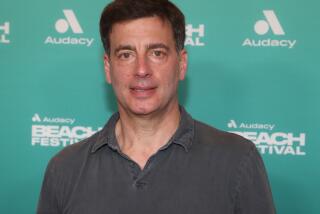FCC Won’t Block Infinity’s KRTH Buy
- Share via
WASHINGTON — The Federal Communications Commission said Tuesday that it will not block Infinity Broadcasting Corp.’s bid to purchase a Los Angeles radio station despite repeated complaints about Infinity’s off-color radio personality, Howard Stern.
Instead, the agency voted 2 to 1 to seek another $400,000 in fines against Infinity for six alleged indecency violations by Stern but to grant Infinity’s application for the broadcast license at KRTH-FM.
New York-based Infinity is already contesting about $1.3 million in fines the FCC has levied against the company in connection with listener complaints about Stern’s talk show. But Infinity said it was “gratified” by the license approval.
Infinity has agreed to buy KRTH from Beasley Broadcast Group for $110 million. In addition, it is seeking FCC clearance for its purchase of Washington stations WPGC-AM and -FM from Cook Inlet Radio Partners for about $60 million.
The FCC acted grudgingly, and its decision not to block the purchase of KRTH underscores the difficulties federal regulators face in grappling with speech that some audiences find offensive.
Commissioner Ervin S. Duggan said he would have opposed the deal if he thought the courts would uphold such an action. But Duggan, who left the FCC on Tuesday to head the Public Broadcasting Service, ultimately sided with Commissioner Andrew C. Barrett.
Voting against the application was James H. Quello, who said: “It is apparent that previous FCC fines have not had a deterrent effect. . . . Approving transfer of additional stations to Infinity at this time might be misinterpreted as the FCC endorsing Infinity and Howard Stern.”
The FCC’s new chairman, Reed Hundt, whose former law firm represented the company selling KRTH, did not participate in the voting.
Stern, whose provocative autobiography “Private Parts” has sold more than a million copies, has built a career on remarks about race, ethnicity and sexuality that some critics say go beyond the bounds of good taste.
But while there has been increasing public outcry against crudeness and violence on the airwaves, the FCC has been constrained in its regulatory role by courts seeking to preserve constitutional guarantees of freedom of speech.
In November, for example, the U.S. Court of Appeals in Washington overturned FCC rules that prohibited radio or TV from broadcasting sexually explicit material between 6 a.m. and midnight. The court ruled that the ban covered too many hours of the day.
More to Read
The biggest entertainment stories
Get our big stories about Hollywood, film, television, music, arts, culture and more right in your inbox as soon as they publish.
You may occasionally receive promotional content from the Los Angeles Times.










